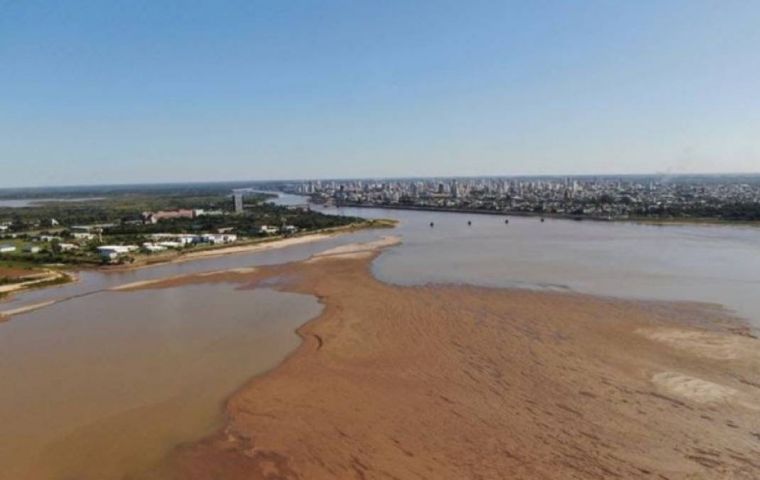MercoPress. South Atlantic News Agency
Paraná river reaches historic lows; worst part far from over
 “Clearly there is a climate change,” said Bordet
“Clearly there is a climate change,” said Bordet The Paraná River had descended yet another three centimeters over the last 24 hours in front of the former capital of Argentina named after it (1853-1860) for a total of 17 centimeters below sea level.
It is a key waterway for the export of agricultural items from the Argentine port of Rosario as well as Paraguay's access to the ocean. The current situation is the worst ever for navigation since it reached -1.40 meters in 1944.
The current downspout keeps the river way below its average of 3.10 meters in July by the city of Paraná, currently, the capital of the province of Entre Ríos, where the river reached 0.50 meters in 1971, and 0.0 in 1970 and 2020.
Argentina's National Water Institute (INA) has forecast that a “clearly unfavorable outlook as of September 30 persists, with a certain probability of extending into the subsequent four months, at least.”
The INA also pointed out that July will be “especially critical” for “water intakes for urban consumption, for cooling power generation plants and industrial processes.” It also warned about problems in “river navigation, fish fauna, bank stability” and “exposure to fires on banks and islands.”
Entre Ríos Governor Gustavo Bordet explained that the current situation “generates a lot of concern, it is a historical downspout that impacts drinking water and this is the most urgent thing that concerns us today, in addition to the environmental” issues.
Bordet also explained he was in permanent touch with local mayors along the river bank. He added that “clearly there is a climate change, fundamentally in the headwaters of the rivers with deforestation, and with a change in the soils and in the cropping systems that modify the environmental conditions.”
Entre Ríos Secretary of Agriculture and Livestock of Entre Ríos Lucio Amavet told Télam that the downspout ”had a strong impact on collectors, filleters, transporters and more than 3,000 families of fishermen who make a living from it“, registering ”the lowest export quota of the last 15 years.“
”It is a level never reached, we in Paraná [city] have no memory of something similar and beyond the economic damages, it is an environmental pain that will take years to recover,“ historian, poet, and singer-songwriter Roberto Romani told Télam.
Romani, the author of some 25 books, called on ”the State, the teaching profession, the media, and families to try to convey what it means to live around the river and its importance” once this historic downspout is overcome.
(Source: Télam)




Top Comments
Disclaimer & comment rulesCommenting for this story is now closed.
If you have a Facebook account, become a fan and comment on our Facebook Page!